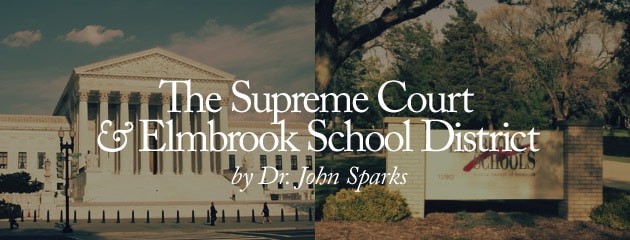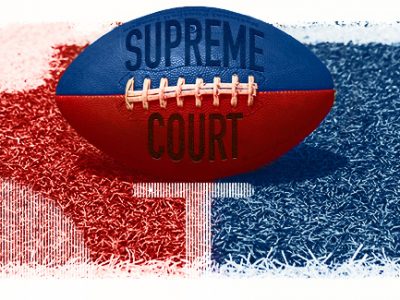
The Elmbrook School District operates two public high schools in suburban Wisconsin. Finding that its own gymnasiums were cramped, hot, and uncomfortable, and at the request of students, it decided to move joint graduation ceremonies to a local Protestant church which offered air conditioning, more space, and greater comfort for attendees.
Not surprisingly, the rented sanctuary contained a prominently displayed cross, religious banners, hymnals, and Bibles. Neither the church’s staff nor members of the church’s congregation participated in the graduation. However, some students and parents complained that exposure to the religious symbols and materials was itself offensive and constituted an unconstitutional establishment of religion. The group sued the school district. The case went to the Seventh Circuit, first to a three-judge panel and then to the full court. Amazingly, the Seventh Circuit Court found for the parents and students, holding that conducting the graduation in a church building was tantamount to the establishing of religion.
The school district sought a U.S. Supreme Court review, especially in light of the high court’s own recent decision in Town of Greece v. Galloway which allowed prayer before a local government’s meetings. The Supreme Court, however, refused to review the Seventh Circuit decision, thus leaving the ruling to stand. Is this the result the First Amendment was designed to produce? An amendment that prohibits the government from “establishing religion?”
Justice Antonin Scalia said “no” and wrote a hard-hitting seven-page dissent to the court’s one sentence refusal to hear the appeal. Scalia first points out that in Elmbrook “it is beyond dispute that no religious exercise whatever occurred” at the graduation event. The complaining students and parents were not objecting to ceremonial content. Instead, they said that they “felt uncomfortable, upset, offended, unwelcome and/or angry because of the religious setting.” But is “being offended” by a one-time religious venue for a public school graduation really equivalent to the government establishing a church? Scalia refers to Justice Anthony Kennedy’s sensible and historically correct statement in the Town of Greece v. Galloway case: “[A]n Establishment Clause violation is not made out any time a person experiences a sense of affront from the expression of contrary religious views.” Scalia reminds his colleagues that a “religious establishment” against which the First Amendment warns is a governmentally mandated and tax-supported church.
Concluding that holding a high school graduation ceremony in a local church because of inadequate school facilities violates the First Amendment trivializes the intent of that anti-establishment language. Secondly, it raises “offensiveness” to the level of a constitutional right. Third, it moves closer and closer to the view that the First Amendment establishment clause requires “religion” and “government” to exist in separate hermetically sealed containers precisely at a time when America’s public institutions are in desperate need of the moral grounding which religious foundations provide.
This one line refusal by the U.S. Supreme Court to review the Seventh Circuit’s errant decision will not receive the media attention that the other full-fledged opinions will receive, but it shows that the court is still sadly confused about what constitutes religious establishment.





Pingback: Glen Meakem | Conservative Talk Show Host » Being “offended” does not constitute an “establishment” of religion: The Supreme Court and Elmbrook School District